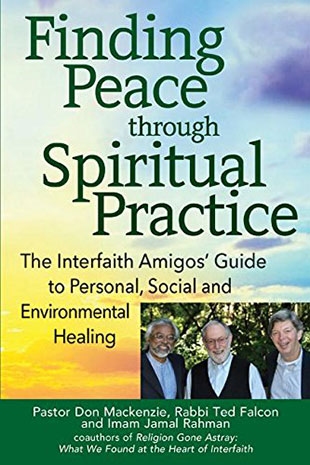Within Judaism, Christianity, and Islam an increasing number of believers are feeling defeated and depressed in their efforts to heal the broken and battered environment, bring about justice for all people, and forge a viable peace for our times. When asked to describe what this malaise feels like, they point to the kind of sadness and powerlessness that comes when hope is nowhere in sight.
In this timely, practical, and enlightening book, Rabbi Ted Falcon, Pastor Don Mackenzie, and Imam Jamal Rahman, who call themselves the Interfaith Amigos, address this lament of social activists with the following premise:
"Spiritual practices can give advocates for social change greater success in their pursuits, and concrete actions in the world can deepen the experience of spiritual seekers. We can maximize positive personal, social, and environmental change by supporting activism with spiritual practices, and we can encourage spiritual seekers to recognize that true spirituality demands action. We all want greater peace, and that requires both inner and outer action."
The Interfaith Amigos are convinced that true peace is not the absence of conflict, fear, and pain but rather is "a way of living in which our conflicts lead us to more meaningful relationships, fear awakens us to live with greater safety, and pain reminds us of where we need support. Peace is an environment in which we help each other become the very best we can be."
After taking a hard look at polarization and the familiar "us versus them" mentality along with the trap of old conditioning, the authors present spiritual practices that have proven helpful in moving them beyond hopelessness; dealing with anger and burnout; offering relief from fears that can lead to violence; and coping with the negative states that hinder "the power of love as a positive force for change."
The Amigos explain that to make spiritual practices a way of life, they need to be done daily – and they give us an abundance of things to try. Each author presents practices from his own tradition for daily use, to mark the rhythms of the year, and to honor the cycles of life. Here are just a few examples:
From the Jewish tradition:
- The Havdalah Candle
- Honoring Your Holiness
- Connecting Heaven and Earth
- Immersion in a Pool of Peace
- The 3-3-3 Breath
- The Heart-Space Meditation
From the Christian tradition:
- Connecting through Music
- Opening Your Eyes to Social Injustice
- I Am Not Alone
- Challenging God
- Centering through Journaling
- Lectio Divina
From the Islamic tradition:
- Sacred Naming
- Connecting with the Other
- Reflection on Divine Signs in Nature
- Sacred Holding
- Closest to the Light
- Deepening Divine Qualities
Along with the authors, we are heartened by the growth of the interfaith movement and welcome the opportunity for people of different traditions to do spiritual practices together. This pioneering book provides a superb model of the fruits of spiritual practices in this era of spiritual hospitality and renewal.
